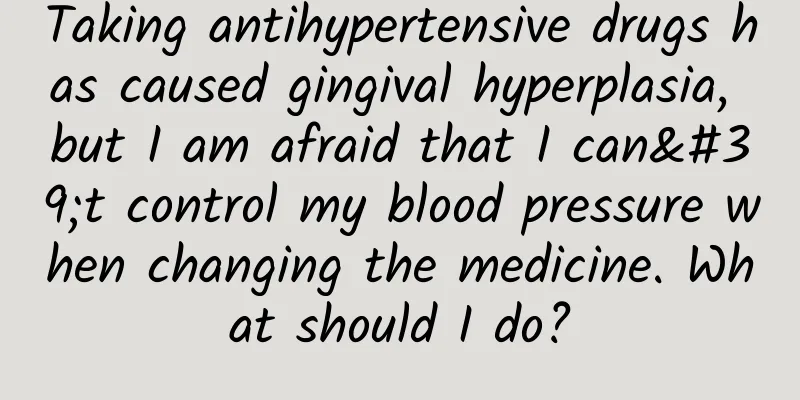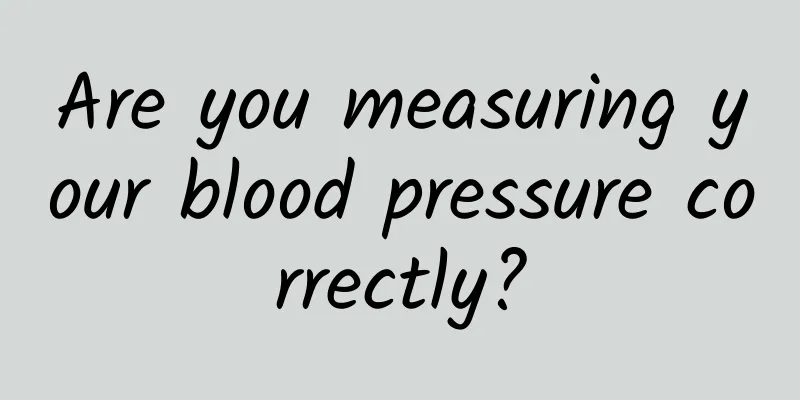Taking antihypertensive drugs has caused gingival hyperplasia, but I am afraid that I can't control my blood pressure when changing the medicine. What should I do?

|
A friend with high blood pressure told Huazi that he had been taking nifedipine controlled-release tablets, and his blood pressure was well controlled, but his gums were getting thicker and thicker, which made it inconvenient for him to eat. He read in the drug instructions that the drug had the side effect of causing gingival hyperplasia, but he was worried that his blood pressure would not be well controlled after changing the drug, and he did not want to change to other drugs, so he asked Huazi if there was any good solution? 1. Drug-induced gingival hyperplasia caused by antihypertensive drugs Huazi told him that calcium channel blockers (CCB), also known as "dipine" antihypertensive drugs, are first-line antihypertensive drugs, and many hypertensive patients are taking them. The side effect of this type of drug in the oral cavity is that it may cause drug-induced gingival hyperplasia. In addition, it can also cause other side effects such as headache, facial flushing, tachycardia, lower limb edema, etc. Drug-induced gingival hyperplasia is caused by the accumulation of extracellular matrix in the connective tissue of the gums due to drugs, and is accompanied by an inflammatory reaction, which can cause the gums to thicken. In severe cases, it can cause the lips to turn outward and affect chewing function. In addition to antihypertensive drugs such as dihydropyridine, phenytoin sodium, a drug for the treatment of epilepsy, and cyclosporine, an immunosuppressant drug, are also common causes of drug-induced gingival hyperplasia. 2. Oral hygiene and drug-induced gingival hyperplasia Drug-induced gingival hyperplasia has a characteristic, that is, it occurs in the toothed area of the mouth. The gingiva in the area where the teeth have fallen out will not hyperplasia, and the hyperplasia of the gingiva in the area where the teeth are located will disappear on its own after the teeth are removed. Studies have found that the gingival hyperplasia caused by drugs is not the effect of the drugs alone, but the result of the interaction between the drugs and dental plaque. Drugs can stimulate the proliferation of gum tissue fibers, and dental plaque can increase the activity of inflammatory factors in the gum tissue, thereby activating fibroblasts in the gums and increasing their responsiveness to drugs. In other words, when drugs and dental plaque coexist, drug-induced gingival hyperplasia will become more serious. Relevant research has shown that among people with drug-induced gingival hyperplasia, after strengthening oral cleaning and health care, the gingival hyperplasia of most people was alleviated, and the gingival hyperplasia of some people could even disappear. 3. Methods to maintain oral hygiene The human oral cavity is connected to the outside world and contains a variety of bacteria. However, only when the bacteria reach a certain number will they cause periodontal inflammation. The level of drug-induced gingival hyperplasia is proportional to the health of the periodontium. Therefore, controlling the number of oral bacteria can improve gingival hyperplasia. To keep your mouth clean, you need to brush your teeth every morning and evening, or after every meal; you also need to learn to use dental floss to clean dental plaque between teeth that a toothbrush cannot reach; and use mouthwash to clean deep into the gums. If the periodontium is already inflamed, or there is a gap between the teeth and gums, and periodontal pockets appear, you need to have a dental doctor perform scaling. 4. Change medication under the guidance of a doctor. Mild gingival hyperplasia generally has no obvious symptoms and does not need to be treated. People with mild symptoms can also get better after strengthening oral hygiene and removing periodontitis stimuli. If the symptoms are severe and have affected normal chewing function, you need to see a doctor to remove the excess gums. Among the antihypertensive drugs of the "dipine" class, nifedipine has the highest incidence of gingival hyperplasia, followed by amlodipine. The incidence is lower in other "dipine" drugs such as levamlodipine, felodipine, and lacidipine. Under the guidance of a doctor, you can choose similar drugs with low side effects, or switch to other types of antihypertensive drugs that will not cause gingival hyperplasia. After stopping the drug, the hyperplastic gums can gradually recover. In summary, antihypertensive drugs of the "dihydrotestosterone" class may cause the side effect of gingival hyperplasia, which is closely related to oral hygiene. Regular oral examinations and enhanced oral cleaning can greatly alleviate and improve gingival hyperplasia. People with severe hyperplasia can also switch to other antihypertensive drugs under the guidance of a doctor. I am pharmacist Huazi, welcome to follow me and let me be the pharmacist by your side. |
<<: Why is bitter melon called bitter melon? How to make delicious bitter melon fried eggs
>>: I heard that the new coronavirus has mutated in the UK?
Recommend
What are the harms of sexual indifference to women?
Whether men or women, it is inevitable that peopl...
Can you fall asleep quickly by eating more carbohydrates before going to bed? Eat this way if you want to sleep well →
"Eating more carbohydrates before going to b...
What are the causes of gynecological inflammation?
For women, gynecological inflammation is definite...
Back to school syndrome! Back to school! Back to school! Please check out these health tips~
Tension, anxiety, procrastination in doing homewo...
Will I get fat after abortion?
Most people will experience puffiness after a med...
Is it better to see a traditional Chinese doctor or a western doctor for irregular menstruation?
Traditional Chinese medicine has always been the ...
Women's sexual response to drugs
Drugs are not only harmful to individuals' he...
Beware of the dangers of eating too much sweets
Most people like to eat sweets, especially women....
What is the birthing process like for women?
In every girl's mind, the process of giving b...
How should eye drops be applied? 90% of people apply them incorrectly
Many people use eye drops Apply eye drops directl...
Introduction to Yoga for Women
Women's conditioning yoga, in fact, is not on...
What are the reasons why girls don't have menstruation?
Female friends usually attach great importance to...
What to do if there is tofu dregs in the vagina
Itching of female vulva with white curd-like disc...
What should women pay attention to when they have kidney cysts
Renal cysts are a common symptom of kidney functi...









